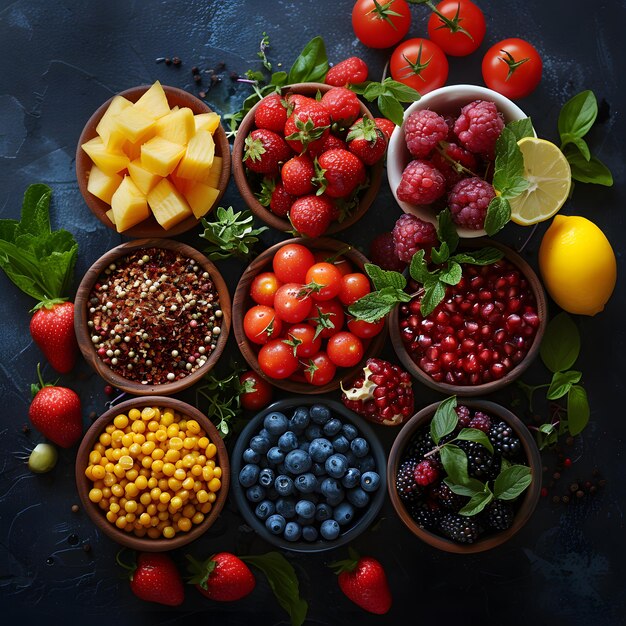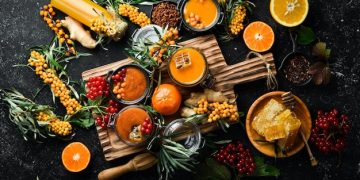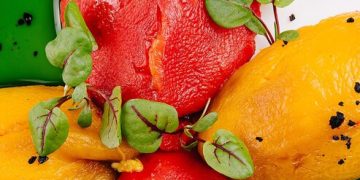Boost Your Immunity This Winter: 5 Superfoods Now

Boosting your immunity this winter requires a strategic dietary approach, and incorporating key superfoods can significantly enhance your body’s natural defenses against seasonal ailments by providing essential vitamins, minerals, and antioxidants for optimal health.
As winter approaches, bringing with it colder temperatures and increased susceptibility to common illnesses, the focus shifts towards fortifying our body’s natural defenses. This season, more than ever, optimizing your health is paramount. To truly boost your immunity this winter: 5 superfoods you need now will be explored, providing a foundational strategy to help keep you resilient and well. Let’s delve into these nutritional powerhouses that can make a substantial difference in your seasonal wellness.
Understanding the Winter Immunity Challenge
Winter brings a unique set of challenges to our immune systems. The colder weather often means spending more time indoors, which can increase exposure to viruses and bacteria. Additionally, reduced sunlight exposure can lead to lower Vitamin D levels, a crucial nutrient for immune function. Understanding these factors is the first step towards building a robust defense.
The Role of Nutrition in Immune Health
Our immune system is complex, relying on a delicate balance of nutrients to function effectively. Every cell, from white blood cells to antibodies, requires specific vitamins and minerals to develop, communicate, and fight off pathogens. A diet rich in nutrient-dense foods is not just about feeling good; it’s about providing the essential building blocks for a resilient immune response.
- Vitamin C: A powerful antioxidant that supports various cellular functions of both the innate and adaptive immune systems.
- Vitamin D: Modulates both innate and adaptive immune responses, with deficiencies linked to increased susceptibility to infection.
- Zinc: Crucial for immune cell development and function, playing a vital role in immune signaling.
- Selenium: An important trace element that acts as an antioxidant and is involved in immune regulation.
Beyond these, whole foods offer a synergistic blend of compounds that work together, far more effectively than individual supplements alone. This is where superfoods shine, providing a concentrated source of these immune-boosting elements alongside beneficial plant compounds.
Environmental Factors and Lifestyle
While nutrition is key, it’s also important to acknowledge other elements that influence our immunity during winter. Insufficient sleep, chronic stress, and lack of physical activity can all compromise our immune responses. A holistic approach that combines proper nutrition with healthy lifestyle choices creates the strongest shield against winter ailments.
The Power of Berries: A Colorful Immune Boost
When we talk about superfoods, berries often come to mind, and for good reason. These small, vibrant fruits are packed with antioxidants, vitamins, and minerals that are incredibly beneficial for immune health. Their availability year-round, either fresh or frozen, makes them a convenient addition to any winter diet.
Why Berries are Immune Champions
Berries, particularly darker varieties such as blueberries, raspberries, and cranberries, are renowned for their high concentration of antioxidants, especially anthocyanins. These compounds give berries their rich color and possess potent anti-inflammatory and antiviral properties. Anthocyanins have been shown to enhance immune cell activity and help protect against cellular damage caused by free radicals, which can weaken the immune system.
- Blueberries: Rich in flavonoids, a type of antioxidant that may reduce damage to cells and boost antioxidant defense systems.
- Raspberries: Contain ellagic acid, a natural phenol antioxidant that has been linked to potential anti-inflammatory benefits.
- Cranberries: Known for their unique Proanthocyanidins (PACs), which can help prevent bacterial adherence to cell walls, particularly in the urinary tract.
Beyond antioxidants, berries are also excellent sources of Vitamin C, a fundamental nutrient for immune function. A single serving of strawberries can provide more than your daily requirement of Vitamin C, making them an accessible and delicious way to strengthen your defenses.
Incorporating Berries into Your Winter Diet
Adding berries to your daily routine is simple and versatile. They make an excellent addition to breakfast bowls, smoothies, or as a vibrant snack. Frozen berries retain most of their nutritional value and are often more economical during winter months. Consider blending them into warm oatmeal, adding them to yogurt, or even incorporating them into savory dishes for a unique flavor profile and nutritional boost.
For those looking for a quick and nutrient-dense option, a berry smoothie can be an ideal start to the day. Combine mixed berries with some spinach, a source of protein like Greek yogurt, and a liquid base for a powerful immune-boosting drink.
Citrus Fruits: Vitamin C Powerhouses
Citrus fruits like oranges, grapefruits, lemons, and limes are synonymous with Vitamin C, a nutrient critically acclaimed for its role in immune function. In the winter months, when cold and flu viruses are prevalent, these fruits become invaluable allies in maintaining our health.
The Immune Benefits of Vitamin C
Vitamin C, also known as ascorbic acid, is a water-soluble vitamin that acts as a powerful antioxidant. It supports various cellular functions of both the innate and adaptive immune systems. It aids in the production of white blood cells, particularly phagocytes and lymphocytes, which are essential for fighting off infections. Furthermore, Vitamin C helps protect these immune cells from damage by free radicals while they are actively working to eliminate pathogens.
- Support for Immune Cells: Vitamin C assists in the production and function of various immune cells.
- Antioxidant Protection: It helps neutralize harmful free radicals, reducing oxidative stress that can compromise immune health.
- Barrier Function: Vitamin C also plays a role in maintaining the integrity of our skin and mucous membranes, which serve as the first line of defense against pathogens.
While Vitamin C is often lauded for its ability to prevent the common cold, research suggests it’s more effective in reducing the duration and severity of cold symptoms rather than preventing them entirely. Regular intake, however, can bolster overall immune resilience, making your body better equipped to fight off infections.
Creative Ways to Enjoy Citrus in Winter
Incorporating citrus fruits into your winter diet is both refreshing and beneficial. Beyond simply peeling an orange, consider adding lemon juice to your water throughout the day for a subtle detoxifying effect. Grapefruit segments can jazz up a morning salad, and lime juice is a versatile ingredient for dressings and marinades, adding a zing while boosting nutrient intake.
For a warm and comforting immune boost, try a hot lemon and ginger tea. Squeeze fresh lemon juice into hot water, add slices of ginger, and a spoonful of honey for a soothing beverage that can help alleviate congestion and provide a dose of Vitamin C. These simple additions can make a significant difference in your daily nutritional intake.

Green Leafy Vegetables: The Foundation of Health
Green leafy vegetables are often championed as nutritional powerhouses, and their crucial role in supporting immune health during winter cannot be overstated. From spinach to kale, these greens are packed with vitamins, minerals, and antioxidants that lay a solid foundation for a robust immune system.
Essential Nutrients in Leafy Greens
Leafy greens are a treasure trove of nutrients vital for immune function. They contain high levels of Vitamin K, Vitamin C, Vitamin A (from beta-carotene), and folate, along with important minerals like iron and calcium. Each of these plays a distinct role in keeping your immune system functioning optimally.
- Vitamin A: Crucial for maintaining the integrity of mucosal surfaces, which are the first line of defense against pathogens.
- Folate: Essential for cell division and the production of new immune cells.
- Antioxidants: Besides vitamins, leafy greens boast a variety of antioxidants that combat oxidative stress and inflammation, key factors that can weaken immunity.
Kale, for example, is particularly rich in glucosinolates, compounds that convert into isothiocyanates when chewed or chopped. These compounds have been studied for their potential anti-cancer properties and their ability to support detoxification pathways, indirectly aiding immune health by reducing the body’s toxic load.
Making Greens a Winter Staple
Integrating green leafy vegetables into your winter diet is easier than you might think. Beyond traditional salads, which might feel less appealing in colder weather, consider incorporating them into warm dishes. Spinach wilts beautifully into soups, stews, and casseroles, adding a nutritional punch without altering the flavor significantly.
Kale can be massaged with olive oil and a squeeze of lemon to soften it for salads, or baked into crispy kale chips for a healthy snack. Don’t shy away from adding a handful of mixed greens to your morning smoothie; the flavor is often masked by fruits, and you’ll get a significant nutrient boost. Regular consumption of these greens forms a cornerstone of a strong immune defense.
Ginger and Turmeric: Nature’s Anti-Inflammatory Duo
Ginger and turmeric, two revered roots in traditional medicine, are superfoods lauded for their potent anti-inflammatory and antioxidant properties. During the winter months, when inflammation and oxidative stress can be heightened, these spices become invaluable for supporting overall health and bolstering immune function.
The Science Behind Their Benefits
The active compounds in ginger, known as gingerols, are responsible for much of its medicinal properties. Gingerols have powerful anti-inflammatory and antioxidant effects, which can help alleviate symptoms of a cold or flu, such as sore throat and nausea. They also have antimicrobial properties, contributing to its immune-boosting capabilities.
Turmeric, on the other hand, contains curcumin, its primary active ingredient. Curcumin is a strong antioxidant and has been extensively studied for its anti-inflammatory effects. Chronic inflammation can suppress the immune system, making the body more vulnerable to infections. By reducing inflammation, curcumin helps the immune system operate more effectively. It’s often recommended to consume turmeric with black pepper, as piperine in black pepper significantly enhances curcumin absorption.
- Gingerols: Provide ginger’s anti-inflammatory and antioxidant benefits, helping with congestion and pain.
- Curcumin: Turmeric’s potent compound, famous for its strong anti-inflammatory and antioxidant actions, crucial for immune modulation.
- Synergy: Together, they offer a combined assault on inflammation and oxidative stress, supporting a robust immune response.
These roots don’t just fight inflammation; they also contribute to overall gut health, which is intrinsically linked to immune function. A healthy gut microbiome helps regulate immune responses, and both ginger and turmeric can play a role in maintaining a balanced digestive system.
Culinary Uses for Optimal Immune Support
There are numerous ways to incorporate ginger and turmeric into your winter diet. Fresh ginger can be grated into stir-fries, soups, and teas. A warming ginger tea with honey and lemon is a classic remedy for colds. Turmeric can be added to curries, stews, and roasted vegetables. Creating a “golden milk” with turmeric, a pinch of black pepper, and warm milk (dairy or plant-based) is a soothing and immune-boosting bedtime drink.
Consider preparing a batch of ginger and turmeric shots by blending fresh roots with lemon juice and a touch of honey; a small shot a day can provide a concentrated dose of their health benefits. Regular inclusion of these spices can provide continuous support for your immune system throughout the colder months.

Garlic: The Ancient Immune Warrior
For centuries, across various cultures, garlic has been revered not just as a culinary staple but as a potent medicinal herb. Its powerful immune-boosting properties make it an indispensable superfood, especially during the challenging winter season when our bodies need all the help they can get to ward off infections.
Allicin: Garlic’s Immune Secret
The primary compound responsible for garlic’s distinctive smell and much of its health benefits is allicin. Allicin is released when garlic is crushed, chopped, or chewed, and it has remarkable antibacterial, antiviral, and antifungal properties. These properties are what give garlic its reputation as an ancient immune warrior.
- Antimicrobial Action: Allicin directly combats a wide range of pathogens, helping to prevent and fight off infections.
- Immune Cell Stimulation: Garlic compounds have been shown to directly stimulate various immune cells, such as natural killer cells and macrophages, enhancing their ability to detect and destroy invaders.
- Inflammation Reduction: Beyond its direct antimicrobial effects, garlic also contains compounds that help reduce inflammation, further supporting a healthy immune response.
Regular consumption of garlic has been linked to a reduction in the incidence of common colds and flu. Even if an infection does occur, garlic may help reduce the severity of symptoms and shorten the duration of illness, acting as a natural preventative and therapeutic agent. For optimal allicin formation, it’s best to crush or chop garlic and let it sit for a few minutes before cooking to allow the enzyme alliinase to convert alliin into allicin.
Integrating Garlic into Your Winter Meals
Garlic is incredibly versatile and can be easily incorporated into countless winter dishes. It forms the base of many savory meals, adding depth of flavor while simultaneously boosting your health. Consider adding extra minced garlic to your soups, stews, and roasts.
For a direct immune hit, some people opt to consume a raw garlic clove mixed with honey, particularly at the onset of cold symptoms. Roasted garlic cloves become sweet and soft, making them a delicious spread for toast or an addition to mashed potatoes. Don’t underestimate the power of this pungent superfood; a little goes a long way in fortifying your immune defenses throughout the colder months.
| Immunity Booster | Key Benefits |
|---|---|
| 🫐 Berries | Rich in antioxidants (anthocyanins) and Vitamin C, reduce cellular damage, and enhance immune cell activity. |
| 🍊 Citrus Fruits | Excellent source of Vitamin C, supports white blood cell production, and provides antioxidant protection. |
| 🥬 Leafy Greens | Packed with Vitamins A, C, K, and folate, essential for immune cell development and mucosal defense. |
| 🫚 Ginger & Turmeric | Potent anti-inflammatory and antioxidant compounds (gingerols, curcumin) to reduce oxidative stress. |
| 🧄 Garlic | Contains allicin, offering strong antibacterial, antiviral, and antifungal properties; stimulates immune cells. |
Frequently Asked Questions About Winter Immunity
While superfoods significantly boost your immune system, they are part of a larger strategy. They enhance your body’s defenses, but cannot guarantee full immunity from all seasonal illnesses. It’s crucial to combine a nutrient-rich diet with adequate sleep, regular exercise, stress management, and proper hygiene for comprehensive protection.
Yes, often frozen superfoods, especially fruits and certain vegetables, are just as effective, if not more so, than fresh options. They are typically flash-frozen at their peak ripeness, preserving most of their nutrients. This makes them a convenient and cost-effective option for maintaining a healthy diet year-round, without sacrificing nutritional value.
The benefits of a nutrient-dense diet are typically cumulative and seen over time, rather than immediate. Consistent intake of these superfoods helps build and maintain a strong immune system. While you might feel more energized quickly, a truly fortified immune response develops with consistent nutritional support, usually over several weeks to months.
For most individuals, consuming whole superfoods is generally preferred. Whole foods offer a complex matrix of nutrients, fibers, and beneficial compounds that work synergistically, providing greater benefits than isolated supplements. Supplements can be helpful in cases of deficiency or specific needs, but whole foods should always be the primary source of nutrients when possible.
Absolutely! Children can greatly benefit from these immune-boosting superfoods. Integrating berries, citrus fruits, leafy greens, ginger, turmeric, and garlic into their diet in age-appropriate ways (e.g., smoothies, mild curries, roasted vegetables) can help strengthen their developing immune systems. Always consider portion sizes and any potential allergies or sensitivities when introducing new foods to children.
Building a Resilient Winter You
Navigating the winter months successfully requires a proactive approach to health, with nutrition at its core. By consciously choosing to incorporate these five powerful superfoods – berries, citrus fruits, green leafy vegetables, ginger & turmeric, and garlic – you are not just eating; you are investing in your wellbeing. Each bite becomes a building block for a stronger, more resilient immune system, ready to face the seasonal challenges.
Remember, while these superfoods offer incredible benefits, they thrive within a holistic health framework. Adequate sleep, regular physical activity, effective stress management, and good hygiene practices all play equally vital roles in maintaining peak immune function. Let this winter be a season where you not only survive but thrive, armed with the knowledge and ingredients to keep your body robustly healthy and protected.





